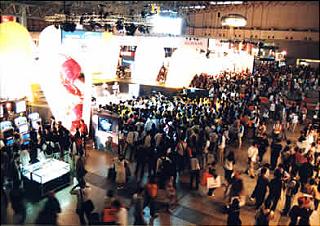CESA seeks to explain contraction of Japanese games market
Computer Entertainment Software Association looks back over last year

According to the latest report from the Computer Entertainment Software Association, the Japanese games market has continued to suffer a decline over the last 12 months. Total hardware and software sales fell to 446 billion Yen, which is an 11% decrease from last year's figures.
There are several explanations for this downward trend, the most important being the inevitable saturation of hardware in the market. Hardware sales did fall nearly 17%, but each of the home consoles has been available for long enough for most interested parties to acquire one if they were ever going to. Residual sales are largely thought to be due to price cuts and consumers purchasing second consoles.
Interestingly, sales of GBA hardware have remained steady throughout the year, promising plenty of scope for a dynamic handheld market. This certainly bodes well for future sales of the DS and PSP, which will be critical in creating any upswing of consumer interest in the Japanese region.
In terms of falling software sales, the Japanese market is a bit of an anomaly, with the US still enjoying a gradual annual increase. However, this is in part the reason for poor software sales in Japan: as the gaming industry pays greater interest to western audiences, development funds are diverted from the hands of teams catering for a specifically Japanese market. The case of Xbox is an obvious example - Microsoft's marketing strategy has done the console relatively well in its domestic capacity, but has failed to capture the imagination of Japanese gamers.
CESA also levels the blame at the increased complexity of console games. On the one hand, the deviation from more traditional gameplay doesn't accurately reflect the tastes of Japanese consumers, and on the other, longer, deeper games inherently reduce the demand for new software. This being the case, Nintendo could be on the right path with its 'back to basics' philosophy behind the DS.
There are several explanations for this downward trend, the most important being the inevitable saturation of hardware in the market. Hardware sales did fall nearly 17%, but each of the home consoles has been available for long enough for most interested parties to acquire one if they were ever going to. Residual sales are largely thought to be due to price cuts and consumers purchasing second consoles.
Interestingly, sales of GBA hardware have remained steady throughout the year, promising plenty of scope for a dynamic handheld market. This certainly bodes well for future sales of the DS and PSP, which will be critical in creating any upswing of consumer interest in the Japanese region.
In terms of falling software sales, the Japanese market is a bit of an anomaly, with the US still enjoying a gradual annual increase. However, this is in part the reason for poor software sales in Japan: as the gaming industry pays greater interest to western audiences, development funds are diverted from the hands of teams catering for a specifically Japanese market. The case of Xbox is an obvious example - Microsoft's marketing strategy has done the console relatively well in its domestic capacity, but has failed to capture the imagination of Japanese gamers.
CESA also levels the blame at the increased complexity of console games. On the one hand, the deviation from more traditional gameplay doesn't accurately reflect the tastes of Japanese consumers, and on the other, longer, deeper games inherently reduce the demand for new software. This being the case, Nintendo could be on the right path with its 'back to basics' philosophy behind the DS.
Companies:
CESA
Read More Like This
